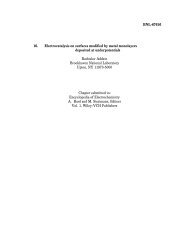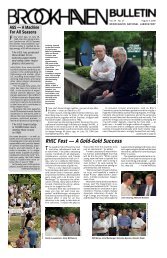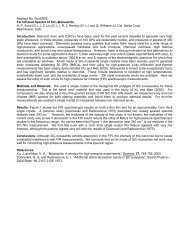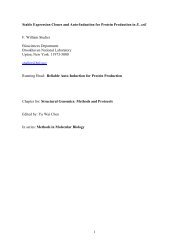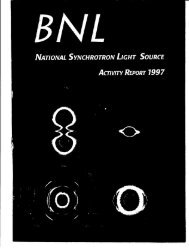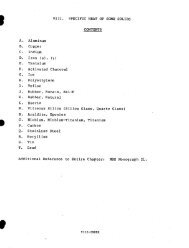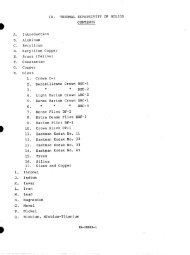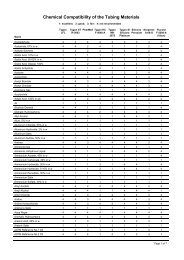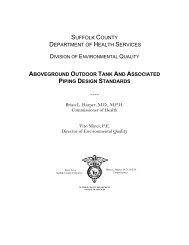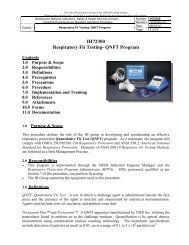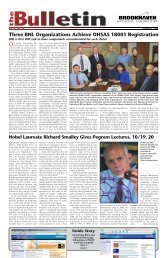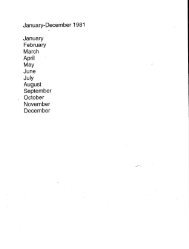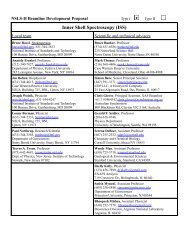Program - Brookhaven National Laboratory
Program - Brookhaven National Laboratory
Program - Brookhaven National Laboratory
You also want an ePaper? Increase the reach of your titles
YUMPU automatically turns print PDFs into web optimized ePapers that Google loves.
FC 4 11:40 AM<br />
Propagation of Nuclear Data Uncertainties in PWR Burnup Pin-Cell Deterministic<br />
Calculations using the Total Monte Carlo Approach<br />
Francesco Ferragut, Pouya Sabouri, Adrien Bidaud<br />
Laboratoire de Physique Subatomique et Cosmologie, CNRS/Université Joseph Fourrier, Institut<br />
Polytechnique de Grenoble<br />
We present here the results of the PWR Burnup Pin-Cell Benchmark UAM I-1b based on the use of the<br />
TENDL library [1] with the deterministic transport code DRAGON [2]. The evaluation of the uncertainties<br />
uses the Total Monte Carlo method. Hundreds of TENDL evaluated files of of the most important<br />
nuclides for this benchmark ( 235 U, 238 U, 239 Pu, 241 Pu) were processed with NJOY and other codes to produce<br />
hundreds of WIMS libraries that DRAGON can read. Then, hundreds of burnup calculation where<br />
done, whose spread is an image of the uncertainties in the evaluated files that is itself an image of the<br />
uncertainties in the model parameters of TALYS. Our methodology gives very similar results than the full<br />
stochastic Total Monte Carlo, where a Monte Carlo code such as SERPENT [3] is used for solving the<br />
Boltzmann equation. In our case, thanks to the deterministic approach, we do not have to subtract the<br />
statistical noise to calculate the uncertainty in the outputs such as keff or nuclide densities. Of course,<br />
our methodology would be limited to applications that are within the recommended domain of use of the<br />
transport code. When compared to methods based on the sampling of the deterministic XS [4],[5] the<br />
advantage of our method is the consistency of the handling of the nuclear data all along the process. We<br />
do not have to generate discontinuities in the cross sections to obtained our energy integrated libraries.<br />
Our sampled libraries are build exactly as any classical groupwise libraries. Our group constants are build<br />
from sampled but continuous cross sections themselves evaluated from sampled pre-evaluation parameters.<br />
Furthermore, our approach is more consistent with the evaluation as we do not sample the lumped<br />
cross sections (scattering, absorption, fission and total), but we lump sampled - probably more physical<br />
- reactions such as elastic, inelastic scatterings and n,xn reaction for instance. Another advantage of the<br />
use of TENDL libraries in a deterministic code is that we can use perturbation theory at least at the<br />
first step of burn up so as to calculate not only the uncertainties but also the sensitivities as a function<br />
of energy of Keff or nuclide inventory changes. We can then better understand which reactions are more<br />
contributing to the uncertainties during fuel burnup. Furthermore, we have developed tools that can build<br />
the covariance matrices of the sampled groupwise nuclear data. The folding of the sensitivities obtained by<br />
Perturbation Theory with these calculated, self-shielded covariance matrices gives results very comparable<br />
to the observed uncertainties calculated with GPT. Thanks to this method, we can not only calculate the<br />
uncertainties but also track down the error down to the actual reactions described in the evaluation (and<br />
not on the lumped ND used in the deterministic code) and give the weight in the error of them and of the<br />
correlations between those reactions. Given the consistency of the method, our method not only complement<br />
the results of available other methods, but also allows for a more straightforward and more coherent<br />
link between the evaluation of the uncertainties given by the evaluator and their impacts calculated by the<br />
reactor physicist.<br />
Corresponding author: Pouya Sabouri<br />
[1] D. Rochman and A.J. Koning. TENDL-2011: TALYS-based Evaluated Nuclear Data Library, PHYSOR-<br />
2012 conference, Knoxville, Tenessee, USA, April 15-20, 2012. [2] G. Marleau, R. Roy and A. Hebert,<br />
DRAGON: A Collision Probability Transport Code for Cell and Supercell Calculations, Report IGE-157,<br />
Institut de genie nucleaire, ecole Polytechnique de Montreal, Montreal, Quebec (1994) [3] D. Rochman<br />
and A.J. Koning, Propagation of 235,236,238 U and 239 Pu nuclear data uncertainties for a typical PWR fuel<br />
element, accepted in Nucl. Technology, October 2011 [4] Artem Yankov, Makus Kleis, Marhew A. Jesse,<br />
85



